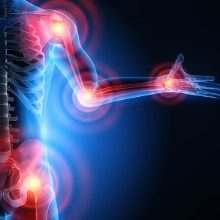Could the gut microbiome be linked to rheumatoid arthritis?
08 November 2019

An imbalance in the gut microbiome could be linked to the onset of arthritis, research has found. Research conducted by Dr Chris Rooney at the University of Leeds investigated the composition of the gut microbiome in people at risk of developing rheumatoid arthritis (RA). The gut microbiome is the complex community of bacteria and other microbes that reside in the gut, and plays an important role in health and wellbeing.
The findings showed that the gut microbiome of ‘at risk’ individuals was significantly different when compared with healthy people. It is important to understand the numerous factors that contribute to the development of disease so that preventative measures can be applied where possible.
The research involved collecting faecal samples from 25 people who did not have arthritis but had been identified as ‘at risk’ due to having non-specific musculoskeletal pain and testing positive for anti-citrullinated peptide antibodies (ACPA). The microbial composition of these samples was determined and compared with healthy (control) samples.
The research found that samples collected from the ‘at risk’ group were significantly different to the control group. The ‘at risk’ group had higher proportions of bacteria in certain families in their gut, including Lachnospiracaea, Helicobacteraceae and Bifidobacteriaceae and lower proportions of other families, such as Bacteroidaceae, Barnesiellaceae and Methanobacteriaceae.
These findings contribute to the growing understanding of the relationship between the gut microbiome and RA. “There is published data identifying a gut dysbiosis in individuals with established RA, and indeed in the at risk population. Our findings suggest the story is more complicated than originally suspected and warrants further research” said Dr Rooney.
Individuals positive for ACPA’s within their blood are more at risk of developing RA. Antibodies identify foreign invaders, such as bacteria or viruses in the body and alert the immune system to clear the infection. ACPA are antibodies which identify an individual’s own cells as foreign, causing the body to attack itself.
When asked if everyone with ACPA develops arthritis, Dr Rooney said, “Not all but the majority do, over a variable time period. Also, individuals that are ACPA positive have a higher risk of developing rheumatoid arthritis, and if they do develop the disease it is typically a more severe illness.”
RA is an autoimmune disease which occurs when the immune system attacks the cells which line a person’s joints. This can cause swelling and pain– particularly in the hands, feet and wrists – and over time, damage to joints, cartilage and even nearby bone.
Dr Rooney hopes that these findings could be used to develop a way to adjust the gut microbiome and delay the onset of RA. He said “Potentially harnessing the microbiome as a therapeutic modality is something I am very interested in. We have teamed up with an industry leader in this field to expedite any findings we have into patient benefit.
“My aim is to perform a longitudinal analysis of the gut microbiome in these individuals at risk of RA development and investigate the changes over time.”
Dr Rooney will present his data at the Federation of Infection Societies Conference 2019 (FIS 2019) in Edinburgh. His talk titled ‘Investigating the role of the gut microbiome as a trigger for arthritis development in individuals at risk of rheumatoid arthritis’ will take place at 10:15 on Thursday 14 November, during the 'Infectious disease futures: trainee scientist' spotlight session.
Hosted by the Microbiology Society, FIS 2019 will take place between the 11–14 November 2019 and is a unique conference which includes the collaboration of 16 societies across the UK, with interests in different aspects of infectious diseases, clinical microbiology, biomedical science and infection control and provides a great opportunity to find out about the latest developments and to connect with key contacts and networks.Image: iStock/peterschreiber.media.
